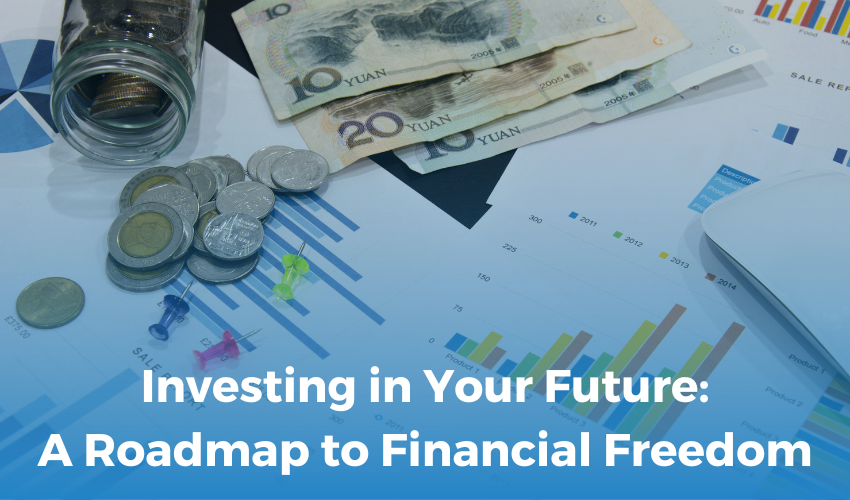

01-12-23
In the journey of life, financial freedom is a destination that many aspire to reach. It's not just about accumulating wealth but ensuring a secure and comfortable future. The key to unlocking this financial freedom lies in strategic investments and smart financial planning. In this blog, we will explore the roadmap to financial freedom, outlining crucial steps to help you make informed decisions that will shape your future.
Set clear financial goals.
The first step in any successful financial plan is setting clear and realistic goals.What are your goals for your finances, both short- and long-term?Whether it's buying a home, funding your children's education, or retiring comfortably, having a clear vision will guide your investment decisions. Goals act as a roadmap, providing direction and purpose for your financial journey.
Create a budget:
A well-defined budget is the foundation of financial freedom. Track your income, expenses, and savings meticulously. This will give you a comprehensive understanding of your financial habits and areas where you can cut unnecessary expenses. Creating a budget and forecasting isn't about restricting yourself but rather about allocating resources efficiently to meet your financial goals.
Emergency Fund:
Because life is unpredictably unpredictable, unforeseen costs can occur at any time. Establishing an emergency fund is akin to setting up a safety net for finances. Three to six months' worth of living expenses should be saved.This fund will provide a buffer during tough times, ensuring that you don't have to dip into your investments or incur debt as a result of unanticipated events.
Eliminate high-interest debt:
Before diving into investments, it's crucial to eliminate high-interest debt. Credit card debts and loans with exorbitant interest rates can hinder your financial progress. Devote your efforts to paying off these debts first, as the interest accrued can outweigh potential investment gains. Clearing your debts will free up resources for more strategic investments in the long run.
Diversify Your Investments:
The adage "Don't put all your eggs in one basket holds true in the world of investing.To minimise risk and maximise returns, diversification is essential. Distribute your investments among a range of asset classes, including mutual funds, stocks, bonds, and real estate.Each asset class carries its own risk and return profile, and a diversified
Take Advantage of Compounding Power by Starting Early:
Time is a powerful ally when it comes to investing. The earlier you start, the more time your investments have to grow through the magic of compounding. Compounding allows your returns to generate additional returns over time, snowballing your wealth. Even small, consistent investments can lead to significant gains when given enough time to compound.
Educate Yourself:
Being informed is essential because the financial landscape is ever-changing. Make the time to familiarise yourself with financial instruments, market trends, and various investment options. Attend seminars, read books, and keep abreast of economic developments. A well-informed investor is better equipped to make sound financial decisions and navigate the complexities of the financial world.
Regularly review and adjust your portfolio.
As life evolves, so should your investment strategy. Regularly review your portfolio to ensure it aligns with your financial goals and risk tolerance. Market conditions, economic factors, and personal circumstances can change, and your investment portfolio should adapt accordingly. Rebalancing your portfolio ensures that it remains well-suited to your objectives and risk appetite.
Plan for Retirement:
Retirement might seem distant, but planning for it should start early. Contribute to retirement accounts such as 401(k)s, IRAs, or pension plans. Take advantage of employer-sponsored retirement plans and consider consulting a financial advisor to create a retirement plan tailored to your needs. The earlier you start saving for retirement, the more financially secure your golden years will be.
Seek professional advice.
Seeking professional advice is just as important as educating yourself. Financial advisors can offer tailored advice based on your particular situation and objectives. They can help you navigate complex financial decisions, optimize your investment strategy, and ensure that you stay on track to achieve financial freedom.
Conclusion:
Investing in your future is a journey that requires careful tax planning, discipline, and a commitment to long-term goals. The roadmap to financial freedom involves setting clear objectives, budgeting wisely, diversifying your investments, and staying informed. By following these steps and adapting to changing circumstances, you can pave the way for a secure and prosperous financial future. Remember, the choices you make today will shape the tomorrow you envision, so invest wisely and embark on the path to financial freedom with confidence
Tags :













































.jpg)
.jpg)
.jpg)
.jpg)


).jpg)














 Get A Quote
Get A Quote
Leave A Comment